* You are viewing Posts Tagged ‘Seventeenth Century’
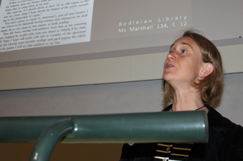
Dr van Romburgh during her talk.
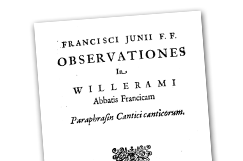
Junius's 'Observationes' from 1655.
In the fourth paper of our seminar series on Thursday 26 May, Dr Sophie van Romburgh (University of Leiden) spoke about ‘Reciprocal Bonds Between Words and Friends, or Correspondence According to Francis Junius’. In a poetic and suggestive analysis, van Romburgh outlined a new framework for appreciating the correspondence of the seventeenth-century philologist, which she edited in 2002, by turning to the closely related genre of commentary (the etymological elucidations of words and concepts in early modern source texts). Van Romburgh argued for a comparable set of ‘discursive dynamics’ between commentary and learned correspondence, and suggested that both attempted to add ‘lustre’ to objective, impersonal, abstract knowledge by embedding it within lived experience and wider networks of words, scholars, and friends. Not only does the thematic eclecticism and ‘easy mix’ of classical, biblical, and contemporary voices evident in Junius’s commentaries evoke the lively, promiscuous character of intellectual correspondence, but they also combine serious etymological pursuit with personal anecdote (especially evident in his ‘Observationes’ from 1655). This connects the ‘formal grid’ of the dictionary or source text with broader ‘constellations of knowledge and people’, relating the exotic and the arcane to the familiar and the experiential, and providing an example of early modern ‘associative rhetoric’ (Roberta Frank) in action. Junius’s commentaries also reference extra-textual conversations with scholar-friends, as do his letters; a powerful reminder that both commentary and correspondence existed within a voice-oriented culture (or ‘oral story world’), and superimposed a ‘vast, living world of spoken communication, of which only some glimpses make it to paper’. Cultures of Knowledge, argued van Romburgh, are created within this vast multi-dimensional space, and out of the lived practices of networks of scholar-friends (‘the ecology of early modern scholarship’). Questions focussed on national differences in discursive and communicative cultures; the social and political, as well as the discursive and intellectual, logic of early modern annotations; the pedagogical origins of associational thinking; and the very different historiographical trajectories described by the history of science and the history of scholarship. Seminars take place in the Faculty of History on George Street on Thursdays at 3pm. For future talks in the series, please see the seminar webpage.
 Podcast now available on the seminar page!
Podcast now available on the seminar page!
James Brown
May 16, 2011
Events, Lectures, Project Updates
Tags: Databases, Editions, Eighteenth Century, Gottfried Wilhelm Leibniz, History of Philosophy, Mathematics, Networks, Seventeenth Century
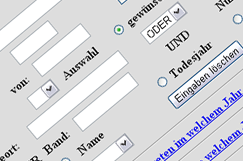
Visit Leibniz correspondence database.
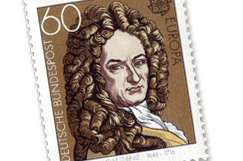
Leibniz depicted on a 1980 stamp.
In the second paper of our seminar series on Thursday 12 May, Dr Nora Gädeke (Gottfried Wilhelm Leibniz Bibliothek) provided us with a privileged insight into ‘Work in Progress: Leibniz’s Correspondence Network’, currently being reconstructed by the Akademie-Ausgabe edition, a group of collaborators in Potsdam, Münster, Hannover, and Berlin, under the aegis of the Academies of Science of Göttingen and Berlin-Brandenburg. In a detailed and reflexive analysis, Gädeke outlined the epistolary activities and contacts of this prolific correspondent, whose surviving letters number c.15,000-20,000, and who saw letter-writing as ‘one of the main characteristics of his life’. She also described the editorial principles and strategies of the definitive, multi-volume Akademie-Ausgabe edition, which include reproducing all items of Leibniz’s corpus chronologically and topically (including all extant copies), as well as the creation of a full critical apparatus. Further, she discussed the practical and conceptual challenges posed by such an ambitious, ‘cinematic’ enterprise. Gädeke concluded her talk, and introduced the question and answer session, by demonstrating the public database of Leibniz’s correspondence, one of a series of innovative online tools developed by the project to facilitate editorial work on the hard-copy volumes and disseminate some key findings beyond the edition itself. Discussion focused on a range of topics, including: the role of patronage in Leibniz’s network; information as a form of ‘social capital’ in early modern Europe; the importance of superimposing places in which letters were sent or received with geopolitical subtleties; Leibniz’s approach to storing and ordering his letters; his motivations for keeping them in the first place; and the key role online databases can play in supporting and publicizing conventional scholarly work on major corpora. Seminars take place in the Faculty of History on George Street on Thursdays at 3pm. For future talks in the series, please see the seminar webpage.
 Podcast now available on the seminar page!
Podcast now available on the seminar page!
The 11th Bucharest-Princeton Seminar in Early Modern Philosophy, which will take place in Bran, Transylvania on 2–8 July 2011, is currently seeking contributions. Organised by the Research Centre for the Foundations of Modern Thought (FME) at the University of Bucharest in collaboration with the Philosophy Department at Princeton University, this year’s event takes as its theme Collaborative Aspects of Early Modern Thought: Philosophical Correspondence and the Republic of Letters. The deadline for the receipt of one-page abstracts and CVs is 27 April 2011. For submission instructions, as well as details of registration, costs, and keynote speakers, please visit the seminar webpage.
 A symposium on Early Modern Data Delivery will take place in the English Faculty of the University of Oxford on Monday 28 February 2011. The event will focus on letters as a manifestation of seventeenth-century information exchange, and will feature the following contributions:
A symposium on Early Modern Data Delivery will take place in the English Faculty of the University of Oxford on Monday 28 February 2011. The event will focus on letters as a manifestation of seventeenth-century information exchange, and will feature the following contributions:
- Johanna Harris (University of Exeter), ‘Obstinate Letters: Lady Brilliana Harley’s Defence of Brampton Bryan’
- Kate McLoughlin (Birkbeck, University of London), ‘Information Delivery in Shakespeare’s Macbeth and Stoppard’s Cahoot’s Macbeth: A Habermasian Reading’
- Katherine Duncan-Jones (University of Oxford), ‘A ‘Tragicall’ Letter (c. 1604): Writer, Recipient, Bearer’
The symposium will be held in Lecture Room 2 from 5pm.
James Brown
February 21, 2011
Project Updates, Publications, Websites and Databases
Tags: Bodleian Resources, Europe, France, History of Medicine, Martin Lister, Montpellier, Networks, Seventeenth Century
 In 1663, Martin Lister left his parents’ house in Burwell, Lincolnshire to study medicine in Montpellier. Whilst in France, he kept a journal in an almanac entitled Every Man’s Companion: Or, An useful Pocket-Book (MS Lister 19, Bodleian Library).
In 1663, Martin Lister left his parents’ house in Burwell, Lincolnshire to study medicine in Montpellier. Whilst in France, he kept a journal in an almanac entitled Every Man’s Companion: Or, An useful Pocket-Book (MS Lister 19, Bodleian Library).
Month by month, Lister noted the medical texts he consulted (and the French romances and comedies he read) in this thin octavo, and annotated the recipes given to him when he lodged with an apothecary. He described the personalities and works of luminaries he met in France including William Croone, Nicolas Steno, and John Ray. Lister performed a series of dissections with Steno, as well as going on natural history expeditions with Ray. Lister also attended the salon of Sir Thomas Crew to discuss ornithology, medicine, and literature, mixing with other fellows of Cambridge and English expatriates. As his time in Montpellier was part of his education as a gentleman, Lister made detailed notes about his visits to gardens and libraries in Paris, manufacturing methods, viniculture, literature and drama, and rules of politesse and art connoisseurship.
Dr Anna Marie Roos, our Lister Research Fellow, has recently been awarded a British Academy Small Research Grant to create a textual edition of the pocketbook with appropriate apparatus. To annotate the edition, she will also utilize 25 pages of memoirs of Lister’s time in Montpellier and 43 pieces of Lister’s French correspondence in the Bodleian Library and in France. As the account of Lister’s journey is so detailed, his grand tour and memoirs will also be recreated as an interactive website using maps, images, and texts, providing a virtual introduction to an early modern medical education.
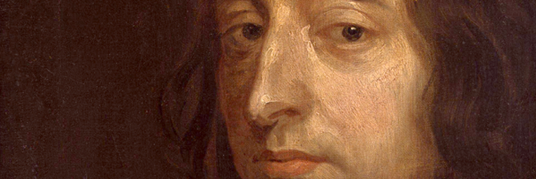
The Project is delighted to announce the presentation of transcriptions of almost all of the surviving correspondence of the jurist, historian, Hebraist, and polymath John Selden (1584–1654). The transcriptions have been generously provided by Professor Gerald J. Toomer, who prepared them (originally for his own research purposes, not for publication) in the course of the research for his magnum opus John Selden: A Life in Scholarship (Oxford: Oxford University Press, 2009). Selden, many of whose letters survive among the holdings of the Bodleian Library, was widely regarded as the most important scholar in Britain in the seventeenth century. He was a major antiquary and historian of English law, whose work was unrivalled before Maitland in the nineteenth century. He was also a central figure in the transmission of Oriental learning to the West, and was acknowledged in his lifetime as one of the greatest Christian authorities on Jewish law and history. He encouraged the study of Arabic, and produced the first English edition of an Arabic text. He was also an internationally recognised theorist of international law (in his Mare Clausum) and natural law (De Iure Naturali et Gentium). His works were caught up in many of the most controversial religious and political issues of the day, provoking praise and polemic in Britain and Europe. His correspondence network extended to northern Europe and eastwards to Aleppo.
The discussions which led to Professor Toomer’s generous agreement to the presentation of these transcriptions on our website were initiated at and facilitated by the international conference John Selden, 1584-1654: Scholarship in Context (Magdalen College, Oxford, 24-26 June 2010), organized by Thomas Roebuck and Jeffrey Miller in association with the Centre for Early Modern Studies and the Centre for the Study of the Book.
The transcriptions will be available in a fully searchable form within our union catalogue at its launch in September 2011. In the interim, we are pleased to be able to provide them as a pdf file (13.5 MB).
Please note that the copyright of the transcriptions remains with Professor Toomer, and that you should not quote from them in papers or scholarly publications without prior written permission (please contact the Project in the first instance). Professor Toomer would also like it to be emphasised that the document is not a conventional scholarly edition, and should not be judged by those standards; the transcriptions were prepared for private use rather than for publication, and in most cases have not been checked against the originals.


Podcast now available on the seminar page!



 A symposium on Early Modern Data Delivery will take place in the
A symposium on Early Modern Data Delivery will take place in the  In 1663,
In 1663, 

 Join
Join 